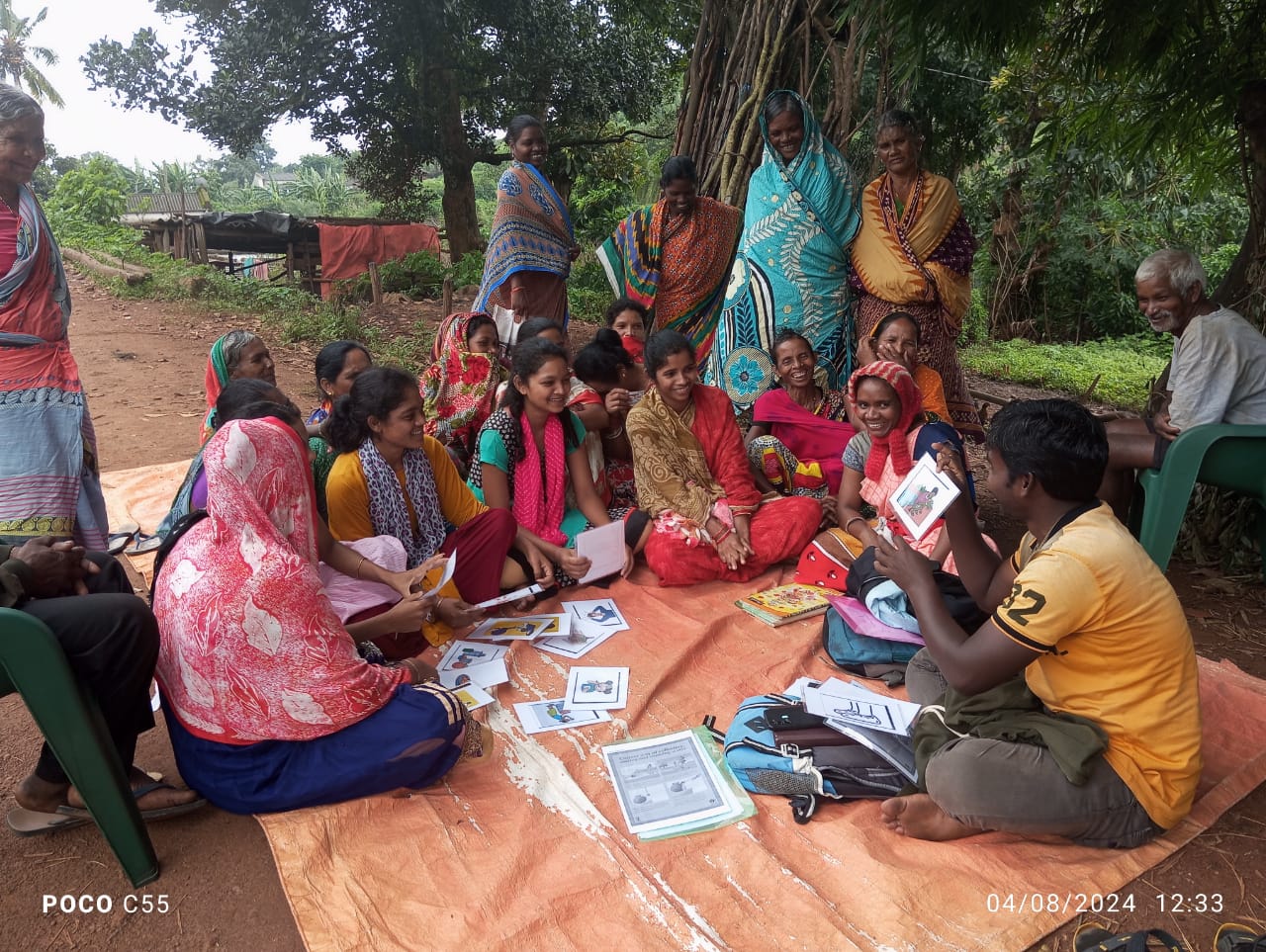Safe Water, Better Nutrition: How Poshan Mitras drive WASH practices in Odisha villages
StoryBy Chandrika Patnaik
18 September 2024
The Poshan Mitra Fellowship's hyperlocal approach helps remote rural communities in Odisha improve water quality, nutrition, and sanitation. Through behavioural change communication, the Fellows drive community-led initiatives for better health and sustainable practices.

Surendra Mukhemajhi conducts a meeting on behavioural change in Janabadi village of Dasingbadi Panchayat.
Photograph shared by Surendra Mukhemajhi
Trilochan Baliarsingh has been actively addressing water contamination in Kandhamal district’s Lambokiari village. Residents reported frequent cases of skin disease, vomiting, and diarrhoea, unaware of the link to their drinking water.
Upon inspecting their well, Trilochan found it contaminated with algae, weeds, and bacteria. He guided the villagers in cleaning and disinfecting it, significantly reducing illness. “The villagers didn’t know what safe water was or that it could be tested,” Trilochan explains. “Explaining them has made a real difference.”
Trilochan is one of many rural youth engaged as Poshan Mitras (Friends of Nutrition) by Gram Vikas to work in its partner villages.
The Poshan Mitra Fellowship
In the remote villages of Odisha, with limited access to safe water and good nutrition, the Poshan Mitra Fellowship programme is vital for improving health and sanitation. This pilot trains Poshan Mitras – service providers whose work drives crucial behavioural changes in hygiene practices – to ensure better health outcomes for rural communities.
The Poshan Mitra Fellowship is a year-long programme, empowering young people from rural areas to become agents of change. Through comprehensive training, the seven inaugural fellows gained the skills and knowledge to monitor water quality and facilitate behavioural change, driving meaningful impact. They collaborate with their communities and Panchayati Raj Institutions (PRIs) to implement initiatives promoting healthier living conditions.
The fellowship focuses on four core components: capacity building, on-the-job training, certification, and ongoing support. Gram Vikas aims to foster a network of grassroots social change advocates through this approach.
The fellowship training covers water quality, nutrition, menstrual health, WASH behaviour, waste management, and behavioural change communication. Fellows also receive life skills training encompassing digital tools like the mWater app, assisting families with online applications for social security schemes, and leadership development. During their on-the-job training, fellows earn a regular income as service providers.
From contaminated water to healthy communities
Water quality management is a critical focus for the Poshan Mitras, as it directly impacts the health and well-being of the communities they serve. Contaminated water is a common issue in many villages, leading to illnesses that affect residents’ nutrition.
Ajit Mallik, a 23-year-old fellow from Sarabadi village in Ganjam district, conducted pre-monsoon water testing, highlighting the challenges of community mobilisation and the satisfaction of seeing positive change. He reflects, “Mobilisation can be challenging initially, but you gain confidence in explaining and getting the message through in the field. There’s much to learn here, and I enjoy my work.”
Turning waste into vegetable gardens and healthier homes
Poshan Mitras also champion sustainable practices like nutrition gardening using greywater. This prevents household wastewater build-up and provides families with access to fresh, home-grown greens, improving their nutritional intake.
Surendra Mukhemajhi, a 31-year-old Poshan Mitra encourages women to engage in nutrition gardening and educates them on basic nutritional and agricultural concepts. From Kandhamal district’s Kalingi village, he has so far visited 36 villages across Dasingbadi and Sirkabarga Panchayats to reinforce sanitation and hygiene practices.
Surendra’s work demonstrates how cultivating home-grown produce can leverage the indigenous knowledge of women, contributing to sustainable development in rural communities. Inspired by Surendra’s sessions, women in Gudrimara village established a nutrition garden, growing vegetables like ladyfinger, tomatoes, pumpkin, green chillies and beans.
Babita Pradhan, 32, from Gudrimara, shares, “The awareness session was insightful. I’m now growing vegetables in my backyard to improve my family’s diet. Using bathroom wastewater for my plants also helps maintain hygiene.”
Behavioural change drives healthy habits
Behavioural change communication (BCC) is a cornerstone of the Poshan Mitra Fellowship, as it fosters positive health behaviours that improve overall well-being. The fellows conduct BCC sessions with mothers, children, and adolescents, using interactive methods like hand wash practice and pictorial card games. The awareness sessions promote kitchen hygiene, toilet hygiene, personal hygiene, menstrual health, waste management, and safe water practices.
Their sessions have been particularly impactful in educating communities about the link between safe water, sanitation, and nutrition. In Tekengia village in Dasingbadi Panchayat, fifteen children aged 6-11 from Uccha Prathamika Vidyalaya enthusiastically participated in a session on WASH practices. They learned how cleanliness contributes to better health and nutrition.
“Seeing the children’s enthusiasm was heartwarming,” says Surendra Mukhemajhi. “They were particularly engaged with the pictorial card games on WASH practices and learned about keeping their environment clean by using dustbins and avoiding littering. Starting these conversations early is crucial, as they lay the foundation for healthier communities.”
The Poshan Mitra Fellowship, a component of Gram Vikas’ Water Secure Gram Panchayat programme, champions nutrition initiatives to build healthier and resilient rural communities.
Ajit Mallik conducting a Behaviour Change Communication programme in a school in Ekalpur village of Ekalpur Panchayat.
Photograph shared by Surendra Mukhemajhi
ACKNOWLEDGEMENT
Ajit Mallik, Trilochan Baliarsing, Surendra Mukhemajhi, fellows from the first cohort of the Poshan Mitra Fellowship helped in data collection of the story. Priya Pillai edited the story.
ABOUT THE AUTHOR
Chandrika Patnaik leads content production in the Communication Team of Gram Vikas.
RELATED BLOGPOSTS
Turning losses into gains: How Mallipanka farmers find success in new crops
Reviving agriculture: Mallipanka’s first strawberry farm story.
Ensuring dignity beyond life: supporting migrant families in their darkest hours
Gram Vikas ensures safe migration and dignified repatriation for deceased migrant workers, supporting bereaved families.
Collective leadership transforms ageing overhead water tank to secure household water supply for all
Kalakhadi’s aging overhead tank revived through collective leadership, ensuring sustainable water supply for the community.